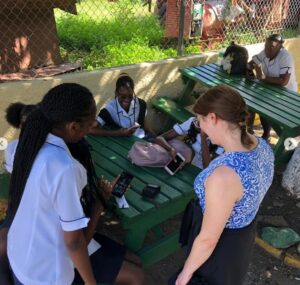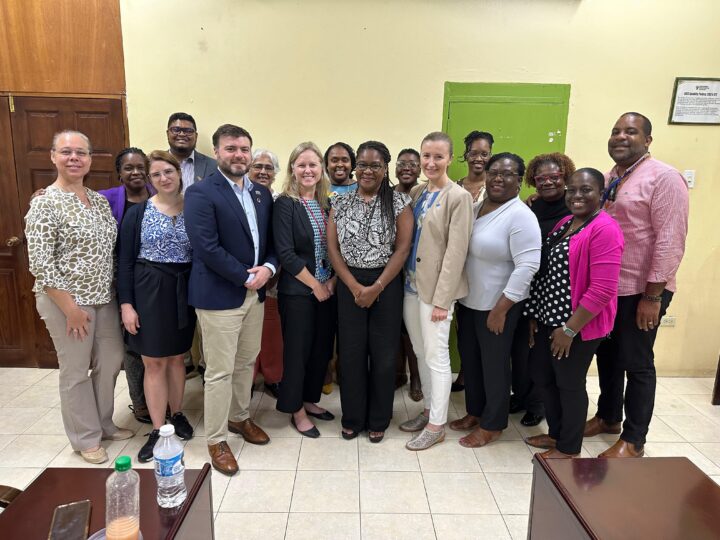Niagara College’s Institute for Global Education and Training is strengthening its collaboration with educational partners in the Caribbean, championing Ecotourism and cross-cultural learning through impactful initiatives.
From October 21 to 25, an NC team was hosted by Excelsior Community College (ECC) in Jamaica and shared its expertise in Ecotourism and Collaborative Online International Learning (COIL) under the Skills to Access the Green Economy (SAGE-07) program – Ecotourism Thematic Partnership. The activities also brought together other Caribbean partners, such as the University of Belize (UB), Dominica State College (DSC), and the Guyana Tourism Authority (GTA).
Funded by the Government of Canada, SAGE is a five-year program managed by Colleges and Institutes Canada (CICan). The program enhances demand-driven, technical, and vocational education training (TVET) offered by Caribbean institutions in climate-related sectors to meet regional economic and environmental demands. Through SAGE 07, NC works with Nova Scotia Community College, Seneca Polytechnic and partners from all six SAGE countries (Jamaica, Guyana, Saint Lucia, Grenada, Belize, and Dominica) on the development of short courses in ecotourism.
Building on this collaboration, two short courses were developed collaboratively with NC’s Caribbean partner under SAGE 07: Green Events, led by Professor Agnes Nowaczek, and Principles for Ecotourism Guides, led by Professor Jennifer Hall, both from NC’s School of Hospitality and Tourism. The courses were designed for tourism students and professionals, equipping graduates with skills that meet employers’ needs and contribute to successful local economies.
Vibrant schedule of activities
The NC team in Jamaica, comprising Nowaczek, Hall, and the Institute’s project manager Esteban Navarro, facilitated a vibrant schedule of activities.
Hall led a session on teaching techniques for tourism guiding, and a Leave No Trace Instagram challenge. This activity empowered ECC students, with support from faculty and partners, to create educational posts promoting sustainable tourism principles for visitors .

Excelsior Community College students were empowered by faculty and partners to create educational posts promoting sustainable tourism principles.
Classroom discussions, facilitated by ECC’s lecturer Paulette Spence-Hines, provided students with a foundation in Caribbean tourism. Spence-Hines also introduced the partner institutions, setting the stage for presentations by representatives from GTA, UB, and DSC, who shared firsthand insights into tourism dynamics in their countries.
Participants from partner institutions also engaged in local cultural immersion with a tour of the Green Grotto Caves, a notable ecotourism site in Jamaica, highlighting ECC’s approach to integrating industry collaboration within its programs.
“A highlight of this time in Jamaica was the collegiality and teamwork, exemplified by the development of a Best Practices for Tourism Guides document created collaboratively,” said Hall. “It will be a great resource to accompany the short course Principles for Ecotourism Guides, developed as part of SAGE-07. The next step will be for our colleagues to plan a pilot of both courses. I look forward to seeing them implemented and used to train tourism professionals.”
Nowaczek and ECC’s lecturers Duane Daley and Bhuvaneswari Gudapati led an introduction to COIL, followed by a live COIL experience between NC students in Canada and ECC students in Jamaica.
The students prepared presentations on tourist attractions from their respective regions, fostering a virtual exchange that connected NC and ECC students through shared insights into local tourism.
Finally, a tour of 360 Recycle Manufacturing allowed partners to explore Jamaica’s innovative circular economy initiative, learning about sustainable manufacturing practices and waste reduction efforts.
“The two courses not only equip learners with practical skills for green economy careers but also foster a global perspective and cross-cultural understanding,” said Nowaczek. “This approach to experiential education goes beyond vocational training; it provides learners with tools for transformative change, encouraging them to approach sustainability with a sense of purpose and empathy. As we look to the future, I am inspired to continue expanding COIL activities.”
The NC team’s presence in Jamaica also created meaningful networking opportunities, including a meeting with Jennifer Cooper, Deputy Director of the Caribbean Regional Development Program at Global Affairs Canada (GAC).
“It was an incredible opportunity to review the program’s progress and exchange valuable insights,” said Navarro. “Cooper’s visit to Kingston allowed participants to share firsthand how the partnership and the project are advancing across Caribbean countries. We also highlighted the critical role GAC’s contributions play in strengthening the green sector and promoting sustainable development throughout the region.”
United Nations Sustainable Development Goals (SDGs)
Through these initiatives, NC continues to support the SDGs, especially SDG 4 (Quality Education), SDG 5 (Gender Equality), SDG 10 (Reduced Inequalities), SDG 13 (Climate Action) and SDG 17 (Partnerships for the Goals).
The week of activities enriched institutional connections between Caribbean partners and Niagara College, inspiring new perspectives on advancing sustainable tourism education.
Niagara College’s Institute for Global Education and Training
Bringing together the expertise of a highly skilled NC team with partner organizations worldwide, Niagara College’s Institute for Global Education and Training proudly provides educational solutions designed to inspire sustainable global change. For over 20 years, NC has been collaborating with global institutions, including developing and delivering customized education and training programs and capacity building projects to support learners around the world and global partners in achieving their goals. Drawing on this expertise, NC established in May 2024 an official global education hub – a one-stop-shop to leverage its world-renowned education and training programs and to offer newly developed modularized global programs. The Institute also strives to support partners in alignment with the United Nations’ Sustainable Development Goals (SDGs).


